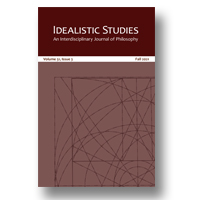|
1.
|
Idealistic Studies:
Volume >
53 >
Issue: 1
Joshua M. Hall
Schiller’s Dancing Vanguard:
From Grace and Dignity to Utopian Freedom
abstract |
view |
rights & permissions
| cited by
Against caricatures of the poet-philosopher Friedrich Schiller as an unoriginal popularizer of Kant, or a forerunner of totalitarianism, Frederick Beiser reinterprets him as an innovative, classical republican, broadening his analysis to include Schiller’s poetry, plays, and essays not widely available in English translation, such as the remarkable essay, “On Grace and Dignity.” In that spirit, the present article argues that the latter text, misperceived by Anglophone critics as self-contradictory, is better understood as centering on gender and dance. In brief, grace is a virtuous power of beautiful gestures associated with women, while dignity is a power of sublime gestures associated with men, and the improvised combination thereof is a divinely androgynous power of gesture that I term “stateliness,” in a three-step choreography of aesthetic education.
|
|
|
2.
|
Idealistic Studies:
Volume >
53 >
Issue: 1
Peter Luba
Rancière’s American Heritage:
Transitory Concepts and Gestural Pragmatism
abstract |
view |
rights & permissions
| cited by
The main aim of the article is to elucidate and trace Jacques Rancière’s American pragmatic heritage. This is exemplified by several (anti)conceptual methods of thinking that the French theorist shares with Ralph Waldo Emerson, Friedrich Nietzsche, and William James. The article examines their shared notions of the symbolic order, transitoriness of concepts, and subjectivization as a way of democratic empowerment of an individual. These three key ideas are then illustrated in the interpreta-tive praxis with Cy Twombly’s anti-conceptual style of painting and the fluid poetry of Frank O’Hara. The conclusion leads to a synthesis of all of these neo-pragmatic approaches into an innovative way of perceiving art and life—through the minute gestures and movements of thought, which are considered by all these thinkers to be more substantial than the substantive concepts themselves.
|
|
|
3.
|
Idealistic Studies:
Volume >
53 >
Issue: 1
Dylan Shaul
Plato and Descartes in Levinas’s Totality and Infinity:
Teaching the Good and the Infinite
abstract |
view |
rights & permissions
| cited by
This article investigates Levinas’s readings of Plato and Descartes in Totality and Infinity, in relation to the question of teaching. Levinas identifies Plato’s Form of the Good and Descartes’s idea of the infinite as two models for his own conception of the Other. Yet while Levinas lauds Descartes’s theory of teaching, he is highly critical of Plato’s. Plato’s theory of teaching as recollection or maieutics is judged by Levinas to display merely the circular return of the Same to its own interiority. In contrast, the Cartesian God supplies the idea of the infinite to a subject incapable of generating it for itself, offering an account of teaching that respects the Other’s transcendent exteriority. I nonetheless argue for the possibility of a rapprochement between Levinas and Plato with regard to teaching. Ultimately, this serves to bolster Levinas’s own theory of teaching, for which both Plato and Descartes can rightly serve as fitting predecessors.
|
|
|
4.
|
Idealistic Studies:
Volume >
53 >
Issue: 1
Amir Yaretzky
Schelling and the Priority of Philosophy to Art
abstract |
view |
rights & permissions
| cited by
In his early writings up unto his so-called “middle period” Schelling treats art as having a crucial role with respect to philosophy. Yet there is no consensus in the secondary literature as to the nature of this role, and the extent to which Schelling changed his mind on the subject. The paper will defend the claim that Schelling holds consistently, from his early texts to the Philosophy of Art, that philosophy is in some sense prior to art while essentially dependent on it. The paper will explore the development of this position from various perspectives. This will shed light on Schelling’s view on both art and philosophy and his view that in the future the two will merge.
|
|
